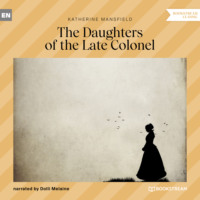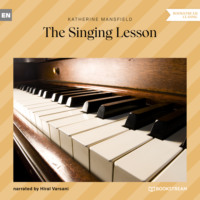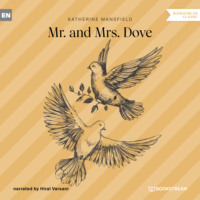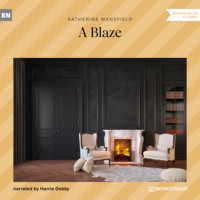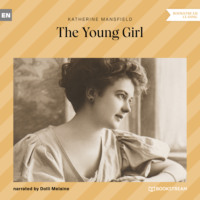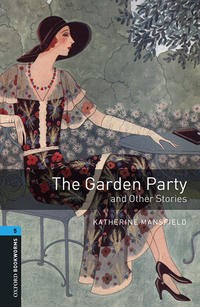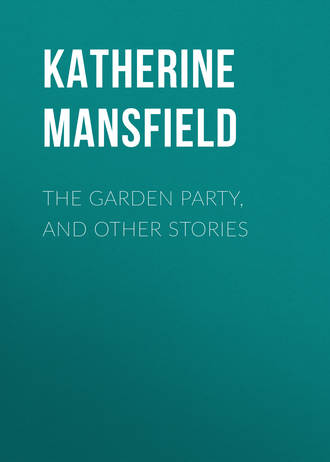 полная версия
полная версияThe Garden Party, and Other Stories
But if it had been cold in the cabin, on deck it was like ice. The sun was not up yet, but the stars were dim, and the cold pale sky was the same colour as the cold pale sea. On the land a white mist rose and fell. Now they could see quite plainly dark bush. Even the shapes of the umbrella ferns showed, and those strange silvery withered trees that are like skeletons… Now they could see the landing-stage and some little houses, pale too, clustered together, like shells on the lid of a box. The other passengers tramped up and down, but more slowly than they had the night before, and they looked gloomy.
And now the landing-stage came out to meet them. Slowly it swam towards the Picton boat, and a man holding a coil of rope, and a cart with a small drooping horse and another man sitting on the step, came too.
“It’s Mr. Penreddy, Fenella, come for us,” said grandma. She sounded pleased. Her white waxen cheeks were blue with cold, her chin trembled, and she had to keep wiping her eyes and her little pink nose.
“You’ve got my—”
“Yes, grandma.” Fenella showed it to her.
The rope came flying through the air, and “smack” it fell on to the deck. The gangway was lowered. Again Fenella followed her grandma on to the wharf over to the little cart, and a moment later they were bowling away. The hooves of the little horse drummed over the wooden piles, then sank softly into the sandy road. Not a soul was to be seen; there was not even a feather of smoke. The mist rose and fell and the sea still sounded asleep as slowly it turned on the beach.
“I seen Mr. Crane yestiddy,” said Mr. Penreddy. “He looked himself then. Missus knocked him up a batch of scones last week.”
And now the little horse pulled up before one of the shell-like houses. They got down. Fenella put her hand on the gate, and the big, trembling dew-drops soaked through her glove-tips. Up a little path of round white pebbles they went, with drenched sleeping flowers on either side. Grandma’s delicate white picotees were so heavy with dew that they were fallen, but their sweet smell was part of the cold morning. The blinds were down in the little house; they mounted the steps on to the veranda. A pair of old bluchers was on one side of the door, and a large red watering-can on the other.
“Tut! tut! Your grandpa,” said grandma. She turned the handle. Not a sound. She called, “Walter!” And immediately a deep voice that sounded half stifled called back, “Is that you, Mary?”
“Wait, dear,” said grandma. “Go in there.” She pushed Fenella gently into a small dusky sitting-room.
On the table a white cat, that had been folded up like a camel, rose, stretched itself, yawned, and then sprang on to the tips of its toes. Fenella buried one cold little hand in the white, warm fur, and smiled timidly while she stroked and listened to grandma’s gentle voice and the rolling tones of grandpa.
A door creaked. “Come in, dear.” The old woman beckoned, Fenella followed. There, lying to one side on an immense bed, lay grandpa. Just his head with a white tuft and his rosy face and long silver beard showed over the quilt. He was like a very old wide-awake bird.
“Well, my girl!” said grandpa. “Give us a kiss!” Fenella kissed him. “Ugh!” said grandpa. “Her little nose is as cold as a button. What’s that she’s holding? Her grandma’s umbrella?”
Fenella smiled again, and crooked the swan neck over the bed-rail. Above the bed there was a big text in a deep black frame:—
“Lost! One Golden Hour Set with Sixty Diamond Minutes. No Reward Is Offered For It Is Gone For Ever!”“Yer grandma painted that,” said grandpa. And he ruffled his white tuft and looked at Fenella so merrily she almost thought he winked at her.
9. MISS BRILL
Although it was so brilliantly fine—the blue sky powdered with gold and great spots of light like white wine splashed over the Jardins Publiques—Miss Brill was glad that she had decided on her fur. The air was motionless, but when you opened your mouth there was just a faint chill, like a chill from a glass of iced water before you sip, and now and again a leaf came drifting—from nowhere, from the sky. Miss Brill put up her hand and touched her fur. Dear little thing! It was nice to feel it again. She had taken it out of its box that afternoon, shaken out the moth-powder, given it a good brush, and rubbed the life back into the dim little eyes. “What has been happening to me?” said the sad little eyes. Oh, how sweet it was to see them snap at her again from the red eiderdown!… But the nose, which was of some black composition, wasn’t at all firm. It must have had a knock, somehow. Never mind—a little dab of black sealing-wax when the time came—when it was absolutely necessary… Little rogue! Yes, she really felt like that about it. Little rogue biting its tail just by her left ear. She could have taken it off and laid it on her lap and stroked it. She felt a tingling in her hands and arms, but that came from walking, she supposed. And when she breathed, something light and sad—no, not sad, exactly—something gentle seemed to move in her bosom.
There were a number of people out this afternoon, far more than last Sunday. And the band sounded louder and gayer. That was because the Season had begun. For although the band played all the year round on Sundays, out of season it was never the same. It was like some one playing with only the family to listen; it didn’t care how it played if there weren’t any strangers present. Wasn’t the conductor wearing a new coat, too? She was sure it was new. He scraped with his foot and flapped his arms like a rooster about to crow, and the bandsmen sitting in the green rotunda blew out their cheeks and glared at the music. Now there came a little “flutey” bit—very pretty!—a little chain of bright drops. She was sure it would be repeated. It was; she lifted her head and smiled.
Only two people shared her “special” seat: a fine old man in a velvet coat, his hands clasped over a huge carved walking-stick, and a big old woman, sitting upright, with a roll of knitting on her embroidered apron. They did not speak. This was disappointing, for Miss Brill always looked forward to the conversation. She had become really quite expert, she thought, at listening as though she didn’t listen, at sitting in other people’s lives just for a minute while they talked round her.
She glanced, sideways, at the old couple. Perhaps they would go soon. Last Sunday, too, hadn’t been as interesting as usual. An Englishman and his wife, he wearing a dreadful Panama hat and she button boots. And she’d gone on the whole time about how she ought to wear spectacles; she knew she needed them; but that it was no good getting any; they’d be sure to break and they’d never keep on. And he’d been so patient. He’d suggested everything—gold rims, the kind that curved round your ears, little pads inside the bridge. No, nothing would please her. “They’ll always be sliding down my nose!” Miss Brill had wanted to shake her.
The old people sat on the bench, still as statues. Never mind, there was always the crowd to watch. To and fro, in front of the flower-beds and the band rotunda, the couples and groups paraded, stopped to talk, to greet, to buy a handful of flowers from the old beggar who had his tray fixed to the railings. Little children ran among them, swooping and laughing; little boys with big white silk bows under their chins, little girls, little French dolls, dressed up in velvet and lace. And sometimes a tiny staggerer came suddenly rocking into the open from under the trees, stopped, stared, as suddenly sat down “flop,” until its small high-stepping mother, like a young hen, rushed scolding to its rescue. Other people sat on the benches and green chairs, but they were nearly always the same, Sunday after Sunday, and—Miss Brill had often noticed—there was something funny about nearly all of them. They were odd, silent, nearly all old, and from the way they stared they looked as though they’d just come from dark little rooms or even—even cupboards!
Behind the rotunda the slender trees with yellow leaves down drooping, and through them just a line of sea, and beyond the blue sky with gold-veined clouds.
Tum-tum-tum tiddle-um! tiddle-um! tum tiddley-um tum ta! blew the band.
Two young girls in red came by and two young soldiers in blue met them, and they laughed and paired and went off arm-in-arm. Two peasant women with funny straw hats passed, gravely, leading beautiful smoke-coloured donkeys. A cold, pale nun hurried by. A beautiful woman came along and dropped her bunch of violets, and a little boy ran after to hand them to her, and she took them and threw them away as if they’d been poisoned. Dear me! Miss Brill didn’t know whether to admire that or not! And now an ermine toque and a gentleman in grey met just in front of her. He was tall, stiff, dignified, and she was wearing the ermine toque she’d bought when her hair was yellow. Now everything, her hair, her face, even her eyes, was the same colour as the shabby ermine, and her hand, in its cleaned glove, lifted to dab her lips, was a tiny yellowish paw. Oh, she was so pleased to see him—delighted! She rather thought they were going to meet that afternoon. She described where she’d been—everywhere, here, there, along by the sea. The day was so charming—didn’t he agree? And wouldn’t he, perhaps?… But he shook his head, lighted a cigarette, slowly breathed a great deep puff into her face, and even while she was still talking and laughing, flicked the match away and walked on. The ermine toque was alone; she smiled more brightly than ever. But even the band seemed to know what she was feeling and played more softly, played tenderly, and the drum beat, “The Brute! The Brute!” over and over. What would she do? What was going to happen now? But as Miss Brill wondered, the ermine toque turned, raised her hand as though she’d seen some one else, much nicer, just over there, and pattered away. And the band changed again and played more quickly, more gayly than ever, and the old couple on Miss Brill’s seat got up and marched away, and such a funny old man with long whiskers hobbled along in time to the music and was nearly knocked over by four girls walking abreast.
Oh, how fascinating it was! How she enjoyed it! How she loved sitting here, watching it all! It was like a play. It was exactly like a play. Who could believe the sky at the back wasn’t painted? But it wasn’t till a little brown dog trotted on solemn and then slowly trotted off, like a little “theatre” dog, a little dog that had been drugged, that Miss Brill discovered what it was that made it so exciting. They were all on the stage. They weren’t only the audience, not only looking on; they were acting. Even she had a part and came every Sunday. No doubt somebody would have noticed if she hadn’t been there; she was part of the performance after all. How strange she’d never thought of it like that before! And yet it explained why she made such a point of starting from home at just the same time each week—so as not to be late for the performance—and it also explained why she had quite a queer, shy feeling at telling her English pupils how she spent her Sunday afternoons. No wonder! Miss Brill nearly laughed out loud. She was on the stage. She thought of the old invalid gentleman to whom she read the newspaper four afternoons a week while he slept in the garden. She had got quite used to the frail head on the cotton pillow, the hollowed eyes, the open mouth and the high pinched nose. If he’d been dead she mightn’t have noticed for weeks; she wouldn’t have minded. But suddenly he knew he was having the paper read to him by an actress! “An actress!” The old head lifted; two points of light quivered in the old eyes. “An actress—are ye?” And Miss Brill smoothed the newspaper as though it were the manuscript of her part and said gently; “Yes, I have been an actress for a long time.”
The band had been having a rest. Now they started again. And what they played was warm, sunny, yet there was just a faint chill—a something, what was it?—not sadness—no, not sadness—a something that made you want to sing. The tune lifted, lifted, the light shone; and it seemed to Miss Brill that in another moment all of them, all the whole company, would begin singing. The young ones, the laughing ones who were moving together, they would begin, and the men’s voices, very resolute and brave, would join them. And then she too, she too, and the others on the benches—they would come in with a kind of accompaniment—something low, that scarcely rose or fell, something so beautiful—moving… And Miss Brill’s eyes filled with tears and she looked smiling at all the other members of the company. Yes, we understand, we understand, she thought—though what they understood she didn’t know.
Just at that moment a boy and girl came and sat down where the old couple had been. They were beautifully dressed; they were in love. The hero and heroine, of course, just arrived from his father’s yacht. And still soundlessly singing, still with that trembling smile, Miss Brill prepared to listen.
“No, not now,” said the girl. “Not here, I can’t.”
“But why? Because of that stupid old thing at the end there?” asked the boy. “Why does she come here at all—who wants her? Why doesn’t she keep her silly old mug at home?”
“It’s her fu-ur which is so funny,” giggled the girl. “It’s exactly like a fried whiting.”
“Ah, be off with you!” said the boy in an angry whisper. Then: “Tell me, ma petite chere—”
“No, not here,” said the girl. “Not yet.”
On her way home she usually bought a slice of honey-cake at the baker’s. It was her Sunday treat. Sometimes there was an almond in her slice, sometimes not. It made a great difference. If there was an almond it was like carrying home a tiny present—a surprise—something that might very well not have been there. She hurried on the almond Sundays and struck the match for the kettle in quite a dashing way.
But to-day she passed the baker’s by, climbed the stairs, went into the little dark room—her room like a cupboard—and sat down on the red eiderdown. She sat there for a long time. The box that the fur came out of was on the bed. She unclasped the necklet quickly; quickly, without looking, laid it inside. But when she put the lid on she thought she heard something crying.
10. HER FIRST BALL
Exactly when the ball began Leila would have found it hard to say. Perhaps her first real partner was the cab. It did not matter that she shared the cab with the Sheridan girls and their brother. She sat back in her own little corner of it, and the bolster on which her hand rested felt like the sleeve of an unknown young man’s dress suit; and away they bowled, past waltzing lamp-posts and houses and fences and trees.
“Have you really never been to a ball before, Leila? But, my child, how too weird—” cried the Sheridan girls.
“Our nearest neighbour was fifteen miles,” said Leila softly, gently opening and shutting her fan.
Oh dear, how hard it was to be indifferent like the others! She tried not to smile too much; she tried not to care. But every single thing was so new and exciting… Meg’s tuberoses, Jose’s long loop of amber, Laura’s little dark head, pushing above her white fur like a flower through snow. She would remember for ever. It even gave her a pang to see her cousin Laurie throw away the wisps of tissue paper he pulled from the fastenings of his new gloves. She would like to have kept those wisps as a keepsake, as a remembrance. Laurie leaned forward and put his hand on Laura’s knee.
“Look here, darling,” he said. “The third and the ninth as usual. Twig?”
Oh, how marvellous to have a brother! In her excitement Leila felt that if there had been time, if it hadn’t been impossible, she couldn’t have helped crying because she was an only child, and no brother had ever said “Twig?” to her; no sister would ever say, as Meg said to Jose that moment, “I’ve never known your hair go up more successfully than it has to-night!”
But, of course, there was no time. They were at the drill hall already; there were cabs in front of them and cabs behind. The road was bright on either side with moving fan-like lights, and on the pavement gay couples seemed to float through the air; little satin shoes chased each other like birds.
“Hold on to me, Leila; you’ll get lost,” said Laura.
“Come on, girls, let’s make a dash for it,” said Laurie.
Leila put two fingers on Laura’s pink velvet cloak, and they were somehow lifted past the big golden lantern, carried along the passage, and pushed into the little room marked “Ladies.” Here the crowd was so great there was hardly space to take off their things; the noise was deafening. Two benches on either side were stacked high with wraps. Two old women in white aprons ran up and down tossing fresh armfuls. And everybody was pressing forward trying to get at the little dressing-table and mirror at the far end.
A great quivering jet of gas lighted the ladies’ room. It couldn’t wait; it was dancing already. When the door opened again and there came a burst of tuning from the drill hall, it leaped almost to the ceiling.
Dark girls, fair girls were patting their hair, tying ribbons again, tucking handkerchiefs down the fronts of their bodices, smoothing marble-white gloves. And because they were all laughing it seemed to Leila that they were all lovely.
“Aren’t there any invisible hair-pins?” cried a voice. “How most extraordinary! I can’t see a single invisible hair-pin.”
“Powder my back, there’s a darling,” cried some one else.
“But I must have a needle and cotton. I’ve torn simply miles and miles of the frill,” wailed a third.
Then, “Pass them along, pass them along!” The straw basket of programmes was tossed from arm to arm. Darling little pink-and-silver programmes, with pink pencils and fluffy tassels. Leila’s fingers shook as she took one out of the basket. She wanted to ask some one, “Am I meant to have one too?” but she had just time to read: “Waltz 3. ‘Two, Two in a Canoe.’ Polka 4. ‘Making the Feathers Fly,’” when Meg cried, “Ready, Leila?” and they pressed their way through the crush in the passage towards the big double doors of the drill hall.
Dancing had not begun yet, but the band had stopped tuning, and the noise was so great it seemed that when it did begin to play it would never be heard. Leila, pressing close to Meg, looking over Meg’s shoulder, felt that even the little quivering coloured flags strung across the ceiling were talking. She quite forgot to be shy; she forgot how in the middle of dressing she had sat down on the bed with one shoe off and one shoe on and begged her mother to ring up her cousins and say she couldn’t go after all. And the rush of longing she had had to be sitting on the veranda of their forsaken up-country home, listening to the baby owls crying “More pork” in the moonlight, was changed to a rush of joy so sweet that it was hard to bear alone. She clutched her fan, and, gazing at the gleaming, golden floor, the azaleas, the lanterns, the stage at one end with its red carpet and gilt chairs and the band in a corner, she thought breathlessly, “How heavenly; how simply heavenly!”
All the girls stood grouped together at one side of the doors, the men at the other, and the chaperones in dark dresses, smiling rather foolishly, walked with little careful steps over the polished floor towards the stage.
“This is my little country cousin Leila. Be nice to her. Find her partners; she’s under my wing,” said Meg, going up to one girl after another.
Strange faces smiled at Leila—sweetly, vaguely. Strange voices answered, “Of course, my dear.” But Leila felt the girls didn’t really see her. They were looking towards the men. Why didn’t the men begin? What were they waiting for? There they stood, smoothing their gloves, patting their glossy hair and smiling among themselves. Then, quite suddenly, as if they had only just made up their minds that that was what they had to do, the men came gliding over the parquet. There was a joyful flutter among the girls. A tall, fair man flew up to Meg, seized her programme, scribbled something; Meg passed him on to Leila. “May I have the pleasure?” He ducked and smiled. There came a dark man wearing an eyeglass, then cousin Laurie with a friend, and Laura with a little freckled fellow whose tie was crooked. Then quite an old man—fat, with a big bald patch on his head—took her programme and murmured, “Let me see, let me see!” And he was a long time comparing his programme, which looked black with names, with hers. It seemed to give him so much trouble that Leila was ashamed. “Oh, please don’t bother,” she said eagerly. But instead of replying the fat man wrote something, glanced at her again. “Do I remember this bright little face?” he said softly. “Is it known to me of yore?” At that moment the band began playing; the fat man disappeared. He was tossed away on a great wave of music that came flying over the gleaming floor, breaking the groups up into couples, scattering them, sending them spinning…
Leila had learned to dance at boarding school. Every Saturday afternoon the boarders were hurried off to a little corrugated iron mission hall where Miss Eccles (of London) held her “select” classes. But the difference between that dusty-smelling hall—with calico texts on the walls, the poor terrified little woman in a brown velvet toque with rabbit’s ears thumping the cold piano, Miss Eccles poking the girls’ feet with her long white wand—and this was so tremendous that Leila was sure if her partner didn’t come and she had to listen to that marvellous music and to watch the others sliding, gliding over the golden floor, she would die at least, or faint, or lift her arms and fly out of one of those dark windows that showed the stars.
“Ours, I think—” Some one bowed, smiled, and offered her his arm; she hadn’t to die after all. Some one’s hand pressed her waist, and she floated away like a flower that is tossed into a pool.
“Quite a good floor, isn’t it?” drawled a faint voice close to her ear.
“I think it’s most beautifully slippery,” said Leila.
“Pardon!” The faint voice sounded surprised. Leila said it again. And there was a tiny pause before the voice echoed, “Oh, quite!” and she was swung round again.
He steered so beautifully. That was the great difference between dancing with girls and men, Leila decided. Girls banged into each other, and stamped on each other’s feet; the girl who was gentleman always clutched you so.
The azaleas were separate flowers no longer; they were pink and white flags streaming by.
“Were you at the Bells’ last week?” the voice came again. It sounded tired. Leila wondered whether she ought to ask him if he would like to stop.
“No, this is my first dance,” said she.
Her partner gave a little gasping laugh. “Oh, I say,” he protested.
“Yes, it is really the first dance I’ve ever been to.” Leila was most fervent. It was such a relief to be able to tell somebody. “You see, I’ve lived in the country all my life up till now… ”
At that moment the music stopped, and they went to sit on two chairs against the wall. Leila tucked her pink satin feet under and fanned herself, while she blissfully watched the other couples passing and disappearing through the swing doors.
“Enjoying yourself, Leila?” asked Jose, nodding her golden head.
Laura passed and gave her the faintest little wink; it made Leila wonder for a moment whether she was quite grown up after all. Certainly her partner did not say very much. He coughed, tucked his handkerchief away, pulled down his waistcoat, took a minute thread off his sleeve. But it didn’t matter. Almost immediately the band started and her second partner seemed to spring from the ceiling.
“Floor’s not bad,” said the new voice. Did one always begin with the floor? And then, “Were you at the Neaves’ on Tuesday?” And again Leila explained. Perhaps it was a little strange that her partners were not more interested. For it was thrilling. Her first ball! She was only at the beginning of everything. It seemed to her that she had never known what the night was like before. Up till now it had been dark, silent, beautiful very often—oh yes—but mournful somehow. Solemn. And now it would never be like that again—it had opened dazzling bright.
“Care for an ice?” said her partner. And they went through the swing doors, down the passage, to the supper room. Her cheeks burned, she was fearfully thirsty. How sweet the ices looked on little glass plates and how cold the frosted spoon was, iced too! And when they came back to the hall there was the fat man waiting for her by the door. It gave her quite a shock again to see how old he was; he ought to have been on the stage with the fathers and mothers. And when Leila compared him with her other partners he looked shabby. His waistcoat was creased, there was a button off his glove, his coat looked as if it was dusty with French chalk.


